Portugal Coronavirus travel restrictions August 2020: rules and trip report from a local
- Get link
- X
- Other Apps
Portugal Coronavirus travel restrictions August 2020: rules and trip report from a local
Portugal | Europe
Updated: 20th August 2020 | Disclosure: This post contains affiliate links
BREAKING NEWS: UK Airbridge | 17:04pm 20th August
From 4am on the 22nd August, passengers travelling/returning to the UK from Portugal will NOT need to self isolate any more, it is on the air bridge list and the FCO travel advisory for Portugal has been lifted with immediate effect.
Over the summer, in fact since May 18th, we’ve been able to get out and explore our beautiful country of Portugal. From road trips in the Alentejo, beach hopping at home in the Algarve, exploring the empty castles of the central region and even a month in Lisbon for a language course, I’ve felt safe, secure and that our nation has taken precautions and health and safety seriously. Now, most Portugal coronavirus restrictions have been lifted for some countries.
Hopefully, I can answer some of those questions here, as I live in Portugal and follow the news updates daily – and will answer any comments you may leave.
For sure, many of us in the world are in the same boat when it comes to lockdowns, to varying degrees and different stages, and have likely seen a lot of our plans for 2020 cancelled. If however, you are planning to travel to Portugal in 2020, I wanted to give some insight into life on the ground, the current rules, and what has been put in place to best control coronavirus in Portugal, particularly when travelling.
Updated 20/07/2020 – Including UK FCO advice, travel corridors, Madeira mask rules, bars re-opening.
*Please note, this is a fast-moving situation and the information provided below is done so in good faith at the time of writing. There are various sources linked out to throughout the article, and particularly at the bottom, however, DanFlyingSolo takes no responsibility for the information provided here and urges you to check all official sources for updates.
For the most part, I have been impressed as a Portuguese resident at the coronavirus situation in Portugal, how it was managed initially, but also with the COVID-19 travel set up in Portugal. I’ve been on many trips in the last month, and (as far as I’m aware) have not had the virus, but I’m being wary and taking all the personal precautions I can, and will try to detail the real situation below.
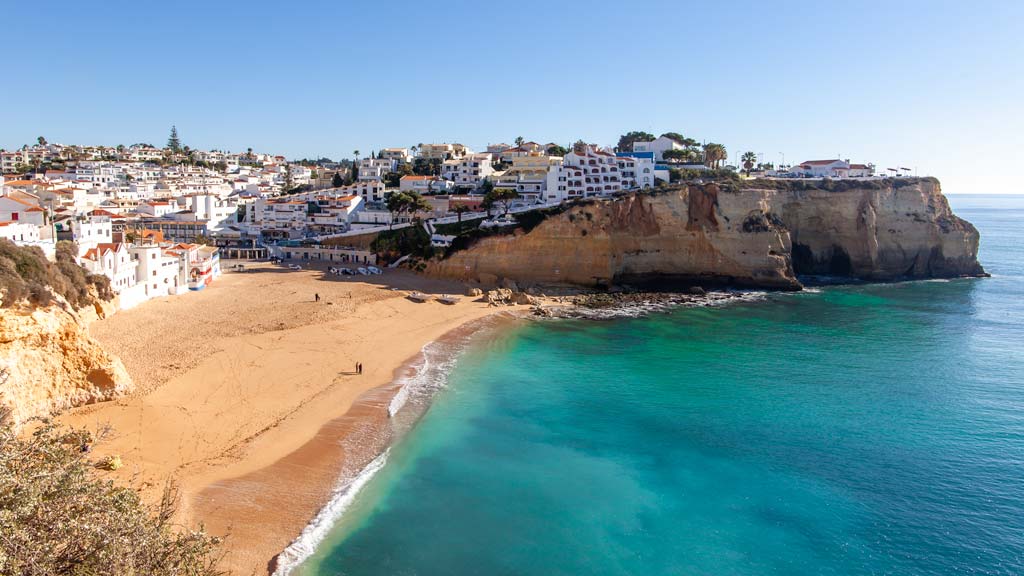
Some of the most popular beaches, like Carvoeiro, were quieter than normal and have monitoring
While I was very supportive of the lockdown initially, I very much saw it as an opportunity to get the health system prepared, and Portugals coronavirus rules and precautions in place before reopening. I didn’t see it as a permanent solution, but preparation time. Tourism is a huge part of life here in Portugal, especially in some regional, seasonal destinations like the Algarve.
It’s easy to dismiss concerns of ‘the economy’ as huge businesses, stock-markets and corporate bailouts, but there are so many small, family-run businesses here reliant on tourism, and no income this summer, means no money to pay the bills in winter – this will of course lead to huge social issues and even in a relatively left-leaning, semi-socialist country, that will become a problem,
As such, I support travel reopening, with the right restrictions in place, and if you are comfortable travelling right now, and can be respectful and take those precautions great – I fully understand it isn’t for everyone just now, but I don’t think we should be shaming everyone who is deciding to travel in the most responsible way they can either.
Here is the current situation for Portugal travel restrictions, and how my recent trips in Portugal have gone down. You can also find a list of resources at the bottom of this page (in various languages) to keep updated, and I’ll aim to update this post weekly.
Table of Contents
Current Portugal Coronavirus Situation in numbers
Our lockdown in Portugal was never as strict as some of our neighbours, we never had 100% home confinement like Spain, and could always go outside for walks and exercise even at the height of the Portugal coronavirus restrictions. Since May 18th we’ve been able to return to restaurants, and taken some regional travel.
When it comes to my own personal experiences below, they were from trips and life from May until now.
Portugal was celebrated a lot in international media as doing very well with the Coronavirus Pandemic, and while there are certainly countries that performed even better, I think being next door to Spain, which tragically suffered, Portugal stood out a little more.
Portugal has one of the highest testing rates in the world, per capita, at the peak it was in the top 5 in the world and continues to test consistently, looking at the test numbers, it looks like over 15% of the population has been tested, which is good, as it gives a more accurate report on cases.
As of today, and these figures are updated daily on https://covid19.min-saude.pt/, we have had 54,992 cases in Portugal since the start of records and 1,788 deaths – there are quite striking differenced between the regions, with the islands, Alentejo and Azores recording much fewer cases, so it’s worth taking a look at that link as it might help you decide where to travel to.
The current active case number in mainland Portugal is around 13,000.
For the island regions, numbers are very low. Madeira has less than 30 active cases, while in the Azores active cases are under 100 and both have testing rules for arrivals – daily updated can be found on https://covid19.azores.gov.pt/ and https://covidmadeira.pt/
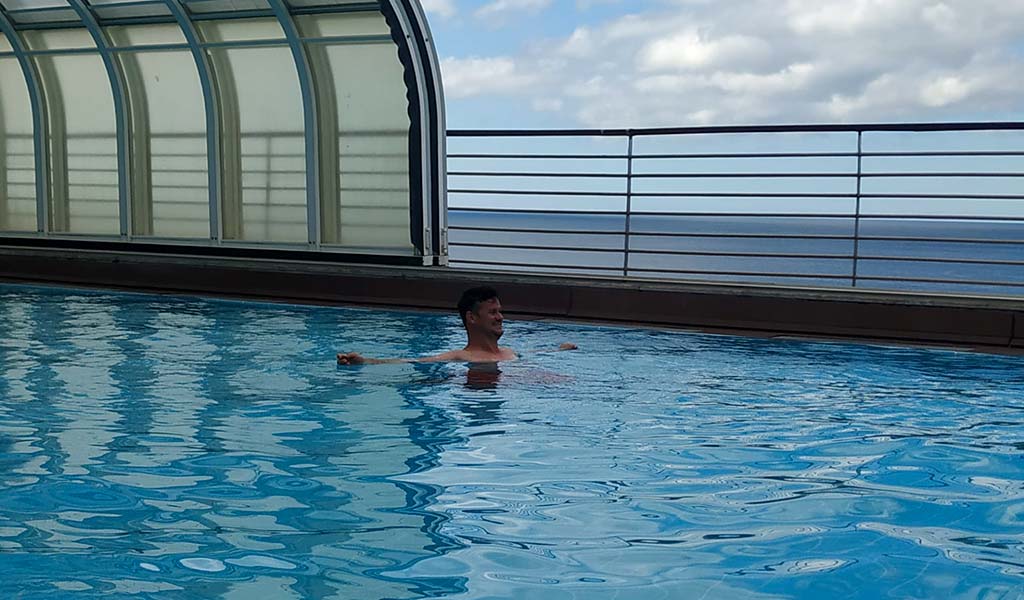
Restrictions at the SANA Sesimbra Pool meaning booking the pool for your timeslot
Who can currently enter Portugal for tourism?
Our road border with Spain has re-opened for tourism and non essential crossings on July 1st.
We are open to flights from the EU, UK and EEA/Schengen countries. For travellers outside of these nations, there are restrictions in place at a top-down level from the EU, for the EU and Schengen external borders.
Please note, some countries within the EU however, have border controls in place for other countries in the EU as part of the emergency situations that allows them to do so. As such, some flight routes might not be running. Please check alongside who Portugal is allowing in here, with your local government travel advice to see if they have any internal rules preventing travel to Portugal.
The EU announced a set list of countries from outside the EU are able to also enter the EU Borders, please check this for the most current updates as I’m not sure when this changes. This list includes: Algeria, Australia, Canada, Georgia, Japan, Montenegro, Morocco, New Zealand, Rwanda, Serbia, South Korea, Thailand, Tunisia, Uruguay.
Please note, flights in doesn’t mean you can come on them as a tourist –While we do have flights coming in and out of Portugal from some destinations outside of the EU that aren’t on the entry list, such as the USA, and mainly the Portuguese speaking communities of Brazil, Cape Verde and other nations in the group, these are running for residents that need to travel for an essential reason between the countries, not for leisure tourism right now. There are testing requirements for those coming from these countries as essential travellers, while the EU flight don’t require testing.
Schengen is the visa-free area in Europe, where you can move around freely once you have entered.
USA Citizens
From the USA, there has been some conflicting reports, and that people have travelled recently to the EU. Following these new, stricter arrangements that went live in July by the EU Borders, I highly doubt you can get around these anymore, so for those with travel booked from the US to Portugal, please contact your airline.
I’m also in a few Portugal travel Facebook groups, and on July 1st one of the members, who is a USA passport holder tried to fly from London Luton to Porto and was denied boarding, because of his Passport, although he has been in the UK for months. Another reader, who commented below, had no problem arriving with a USA passport.
So, it does seem that the EU border rules are (in some cases, if not all) now being applied to Passports, and not just incoming destination of origin. Please check with the consults for the latest rules for USA Passports before making any bookings – and also with your airline, as it seems some airlines are interpreting the rules differently.
Travel from the UK
The FCO travel advisory for Portugal (mainland and islands) has now been lifted, so travel insurance will be valid.
From August 22nd at 4:00 am Portugal moves onto the airbridge list approved by the UK and as such, you will not need to quarantine when you return after this date. There are no quarantine or testing requirements when you arrive to mainland Portugal. See below for info on Madeira and The Azores testing on arrival situation.
Bottom line for Brits – right now you can travel to Portugal, and enjoy an amazing holiday.
Also, the UK Gov say these lists can change at anytime, so you might be on holiday in Portugal, yet by the time you fly home the rules could have changed and you’ll have to quarantine for 14-days anyway. So keep this in mind when making your bookings to visit us ;)
Cruises
Cruise ships docking and disembarking is currently banned, although with the industry on pause, I expect this to continue for some time – an update will follow later in August.
Coronavirus traffic light system for beaches in the Algarve

One way beach system in Sesimbra

Portugal coronavirus entry requirements, rules, and airport procedures
So, if you are eligible to travel to Portugal right now based on the criteria and countries detailed above, what are the rules for entering, and also when you arrive?
Well, these can be broken down by region, as follows.
Mainland Portugal
The mainland of Portugal is the majority of Portugal on the Iberian Peninsula, next door to our lovely neighbour of Spain.
Currently, there is no quarantine, or testing on arrival for mainland Portugal related to coronavirus restrictions – unless you are arriving from a country that is on the essential travel only list (for example USA/Brazil) in which case you will need to test before flying, or perhaps can request a test on arrival – please check with the SEF border office to confirm. For the purpose of below, I will focus on EU/approved for tourism incoming passengers.
While most municipalities in mainland Portugal are on the same rules, there are obviously regions that have much fewer cases, and thus deemed much safer (like the Algarve and Alentejo). The situation in Lisbon which saw it have separate rules has also massively improved, and I felt very safe when I spent three weeks there in July.
Here is what to expect at the mainland airports (Faro, Porto and Lisbon) from friends and people I’ve spoken to that have travelled – keep in mind who is allowed to fly into Portugal, from that section above.
Firstly, the flight might be completely full or rather empty – I’ve heard reports on both. Just don’t expect empty middle seats or social distancing on the flight, it’s basically impossible. You will be wearing a mask, an N95 or high-quality one that filters more particles will likely be more helpful in compact spaces like this, although I offer no health advice on this. Bring sanitiser to keep your hands clean, and wash your hands before boarding, and on arrival.
When you arrive in Portugal, the flight numbers in and out are heavily reduced, so social distancing in lines is much easier. In theory, you will have filled your information in on the flight, and these documents will be collected by the airlines.
There are heat camera sensors at all the airports now, so temperature checks are being done even if you don’t notice them. There are SEF (border agents) monitoring these, and if you flag up the heat sensor, they will take you aside, and potential tests and quarantine will follow. Yes, some people who carry COVID-19 will not have a temperature, but this is the current situation.
For most of mainland Portugal, the rules follow wearing masks inside public spaces and transport, social distancing rules, gatherings are limited and no alcohol to be drank on public roads – bars close at 1am. Beyond that, it’s kind of life as normal, with more details in the following sections.
Lisbon (special status for parts of greater Lisbon)
Most of the restrictions in Lisbon have also been lifted, currently the only main differences are that nightclubs and bars have to close at 8pm (so, not a great nightclub!) and you can only get alcohol after 8pm while having a meal. This, however, looks likely to be lifted before the end of August and will have the same rules as the rest of the country.
As I said above, I spent three weeks in Lisbon in July and the accommodation was great value, it was rather quiet, and I felt very very safe there.
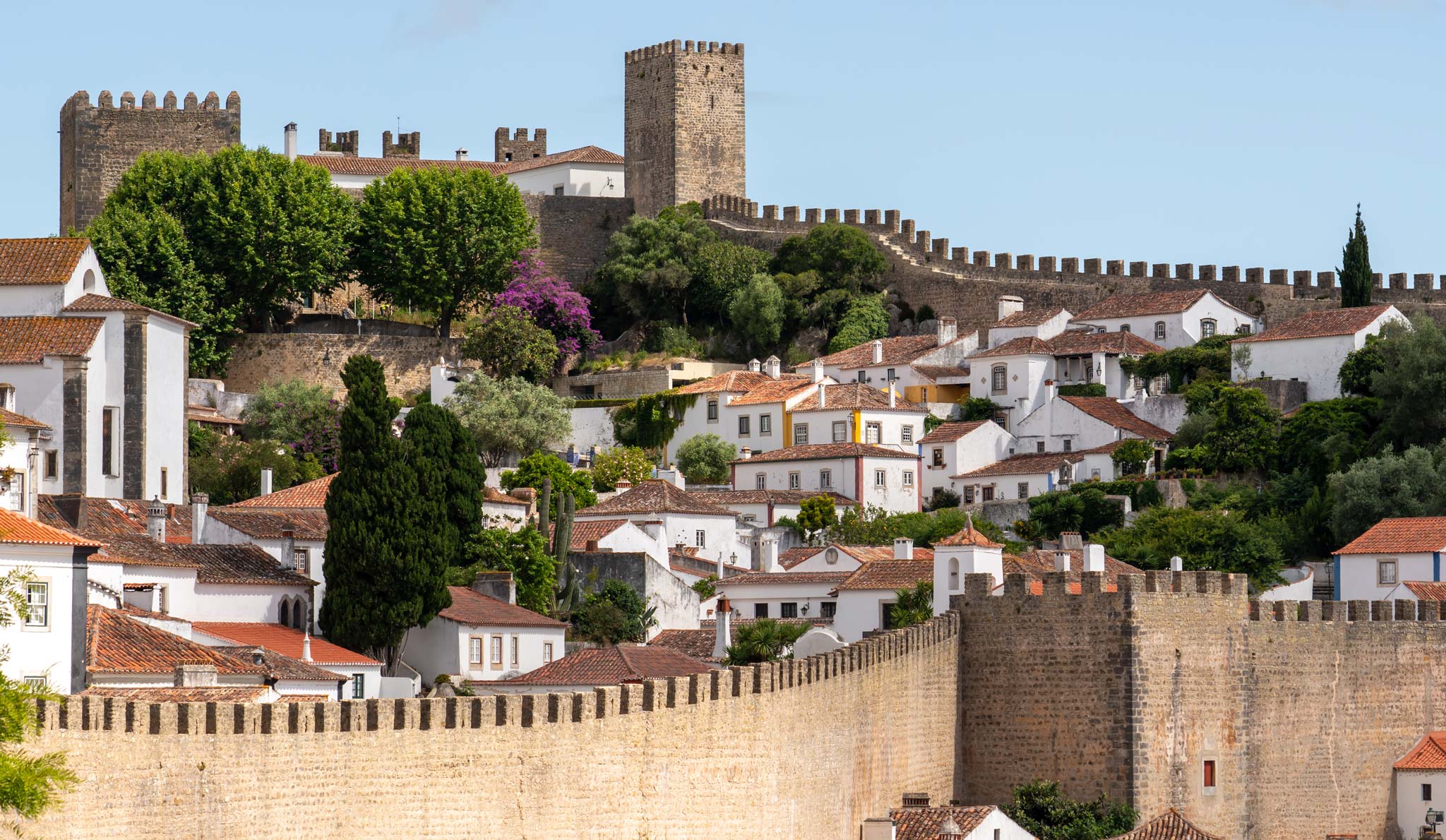
Popular tourist sights like Obidos were basically empty when I visited in June
Both Madeira and the Azores have autonomous governments, and as they have both had very low COVID-19 rates, they are keen to keep it that way.
Madeira
The rules once inside of Madeira are pretty similar to the rest of Portugal. However…
On August 1st Madeira announced that masks would become mandatory at all times in Public!
The info on this is on the tourism board website (use Chrome to auto-translate to English) – you must wear them when in the mountains, in parks, and when walking in public streets. They can be removed when sunbathing/swimming at the beach. Personally, I think this is a bit extreme and I have cancelled my planned trip as I don’t want to hike with a mask – that said, I don’t know who would even be enforcing this hiking in the mountains so it all seems a strange idea to have these rules the rest of the country doesn’t have.
Anyway, if you do decide to visit…
They have produced a really detailed PDF, available in English, which highlights everything – from what happens on arrival, to what happens at all kinds of establishments in the two inhabited islands that make up the Madeira archipelago (when travelling between Madeira and Porto Santo, there is no testing or limits).
Here are the brief key points of what to expect on arrival, and the requirements:
- It’s recommended to do a test 72-hours prior to travel, and receive a negative result. Although this can be done on arrival instead.
- There is a contact tracing app now in Madeira, called ‘MADEIRA SAFE TO DISCOVER’ – travellers should upload health documents to this app prior to arrival, or via the website.
- On arrival, thermal screening takes place, and those who have already completed the test prior to travel will have expedited processing through the airport to leave
- For those needing a test, a free test will be provided at the airport. It will take about 12 hours before they ring you with the results, during this time you must stay in isolation at your accommodation. If the test is negative, enjoy your holiday, and keep the app on your device, otherwise you may be check in on by telephone.
- If your test is positive, you and your group will be placed in confinement at a hotel as designated by the health service. The local government will cover your costs (this was the case initially but I’m sure this will change due to costs, so please do check with them before travelling if it will still be the case on your dates) for any medical expenses, accommodation and meals. A week later, the group will be given a second test, and if negative you can begin your holiday. A positive result means further confinement (it isn’t detailed who covers the cost then)
- There looks to also be an option to repatriate back to your own country, if the airline will carry you. This cost is on you, or your travel insurance (if they cover COVID-19 related matters)
I highly recommend you refer to this PDF for all those details (in English).
The Azores
The Azores have produced a word document with the current situation on, which can be read here in English.
Here are the brief key points of what to expect on arrival at any of the airports, Santa Maria, Terceira, Pico and Faial (from outside, not between – you can move between the islands once you receive your negative test results, however may need a second test, see below), and the requirements:
- Provide health form information on arrival, based on three options:
- If you have proof of negative test within 72-hours before flying, you are clear to enter the country with the lab report and continue your holiday. If you are staying longer than 7 days in the Azores, you can enjoy your holiday with the negative result, however you will have to complete another test, on the 6th day AFTER your initial test, and have another negative result. You will be provided with details of the local county health services to arrange this with.
- If you haven’t had a test before flying, you can have the test at the airport. You will then stay in isolation at your accommodation until you get the results. When you have the negative result, you can start your holiday. The same applies though, if staying longer than 7 days, you will also need to take another test 6 days later.
- If you test positive, you will have to quarantine until you receive a negative result on another test.
- If you refuse the test, your other options are to stay in isolation until you get the next flight available out of the islands, or take a 14-day quarantine in a dedicated isolation hotel, with the full cost being on you.
You pay for your 14-day quarantine if found positive, but both the test on arrival and the second test if needed will be free.
Bars on the island of São Miguel currently must close by 10pm.
Clean and Safe Portugal Initiative
Portugal introduced its own ‘Clean and Safe’ protocols very early on in the game, which also meant they were the first country to receive the ‘Safe Travel’ stamp by the World Tourism Council.
The Clean and Safe stamp and coronavirus protection rules in Portugal are covered in-depth on the Visit Portugal website which lists all the requirements for different types of business, and you’ll see the stamp on a lot of businesses booking pages.
The stamp basically is given to any business that is meeting those defined health and safety requirements and COVID-19 precautions as defined by the Portuguese health authorities.
While there is a criteria to meet, and online training, especially focused on cleaning and hygiene to follow, businesses certify and then have inspections, randomly, afterwards to ensure the standard is met.
A website, dedicated to Clean and Safe has now been launched at https://portugalcleanandsafe.com/ where you, as a visitor, can search for a business, check they have the stamp and see the measures they have put in place.
Most importantly you as the visitor can leave a rating on if the business met the criteria for clean and safe. This helps to keep businesses accountable to their stamp, as poor ratings will see them removed, or re-inspected.
There looks like an option to search a map, and see local businesses who have the stamp is in testing right now too.
Portugal Health passport and dedicated COVID Portugal Insurance
Portugal has launched two products this year, specifically for visitors and providing coverage in relation to health and COVID-19.
The first is the Portugese Health Passport – you can read the details here but there are various packages of healthcare options available for you while here, in private hospitals and I believe this was actually developed for general health tourism not just COVID-19, but has become more well known due to the current situation.
There is also a dedicated Portugal Travel Insurance which includes COVID-19, which you can see more about here and might be worth considering if you don’t have any Coronavirus cover with your usual insurer – I haven’t looked into it much, so please do review if it’s suitable for your needs before purchasing it.
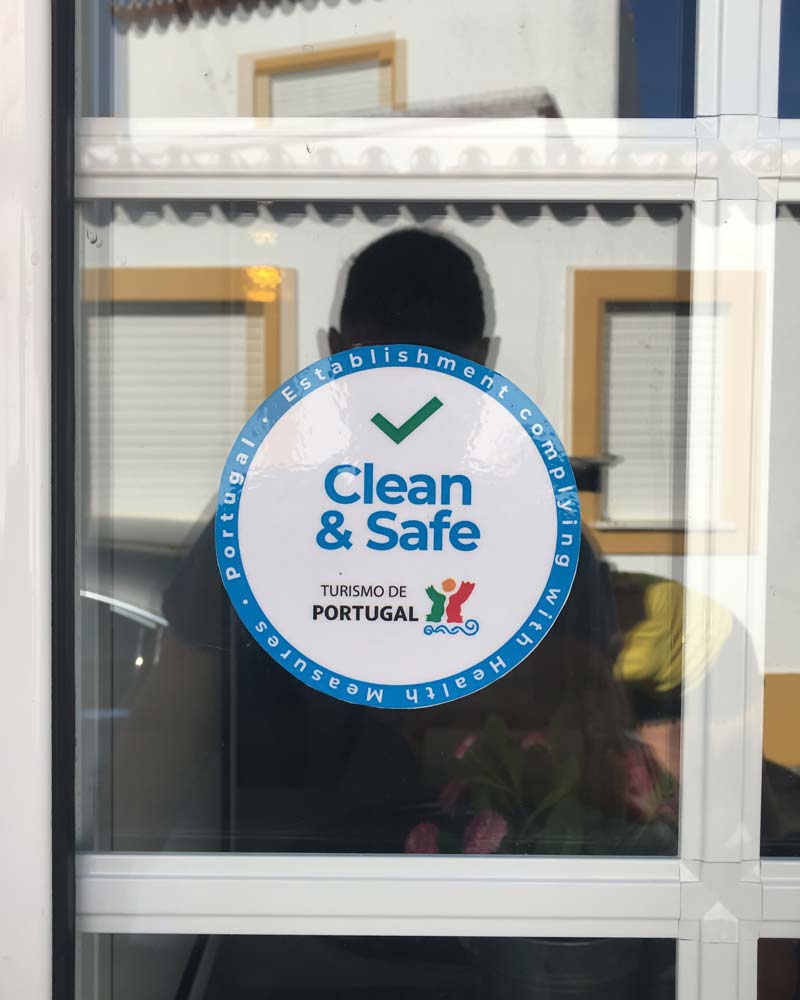
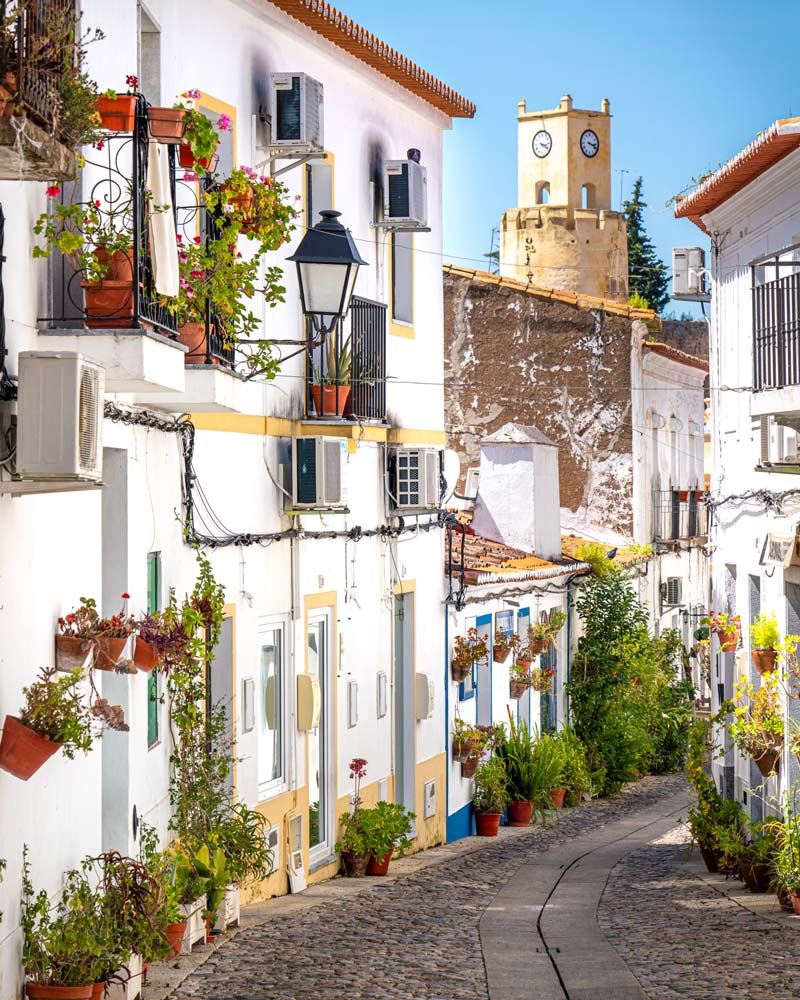
Things to consider before booking or travelling to Portugal in 2020
The first thing to consider is are you allowed to enter the country, keep an eye on the rules of countries who can enter Portugal, and also the Schengen zone, using your local countries travel advisories, EU and destination countries pages – information can change very quickly, Greece announced they would reopen to USA travellers one day, and then changed it the next after people had booked flights – the dramas with the airbridges in the UK when Spain was removed with just a few hours notice – I’ll be honest that the communication and finding the right information for this is a bit of a mess for those outside the EU.
Are you insured? Obviously, a lot of countries still have general travel ban advice for their residents, which can null insurance. Likewise, a lot of policies aren’t covering for anything Coronavirus related or cancellations.
Are you prepared to adapt? This one certainly isn’t limited to Portugal, as we will see many countries change and adapt their rules over the coming months as the situation changes. Booking last minute will help, being prepared with free cancellations if needed, and perhaps having to change the region you stay in. No one fully knows what the future holds, so any decision has to be one you feel comfortable with.
Also, keep in mind some airlines are still continuing to cancel flights to countries, even when they have reopened for tourism.
You’ll also want to consider where to go based on case numbers, how to get around, where to stay based on what you feel comfortable with and so on, I’ll cover these in the trip report below.
Also, if you don’t want to play by the rules here, such as wearing masks, and intend on being difficult, argumentative, and cause problems – then don’t come. I’ve seen the rare visitor from countries where masks aren’t required arguing about them, please don’t be this person and just respect the local rules.
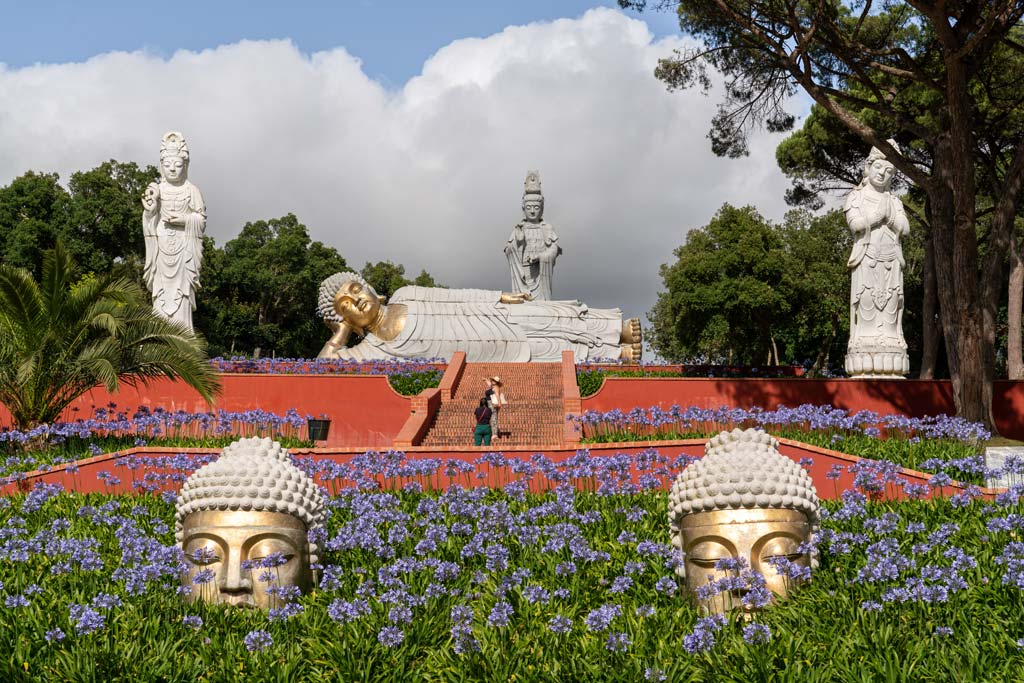
Places like Buddha Eden offer a chance to imagine you’ve left Europe, from Portugal
Portugal COVID-19 General Rules
There are a few general rules that apply in most ways of life in Portugal right now, listed below. For particular activities and places, see the relevant sections below.
- 2metre distance rule – though this has been relaxed a little bit in terms of tables spacing etc nowadays.
- Masks in inside spaces, such as public transport, shopping, or when entering a restaurant – luckily most of our life, from eating to relaxing is done outdoors in Portugal (different in Madeira)
- Social distancing rules in place in all aspects of life, from the beach to the cinema
- Fines are in place for those flouting the rules
- Gathering numbers are limited
- No alcohol to be consumed on public roads
For the most part, however, I will say my life seems pretty normal here on a day to day basis, apart from not really ‘working’ as the job scene is limited.
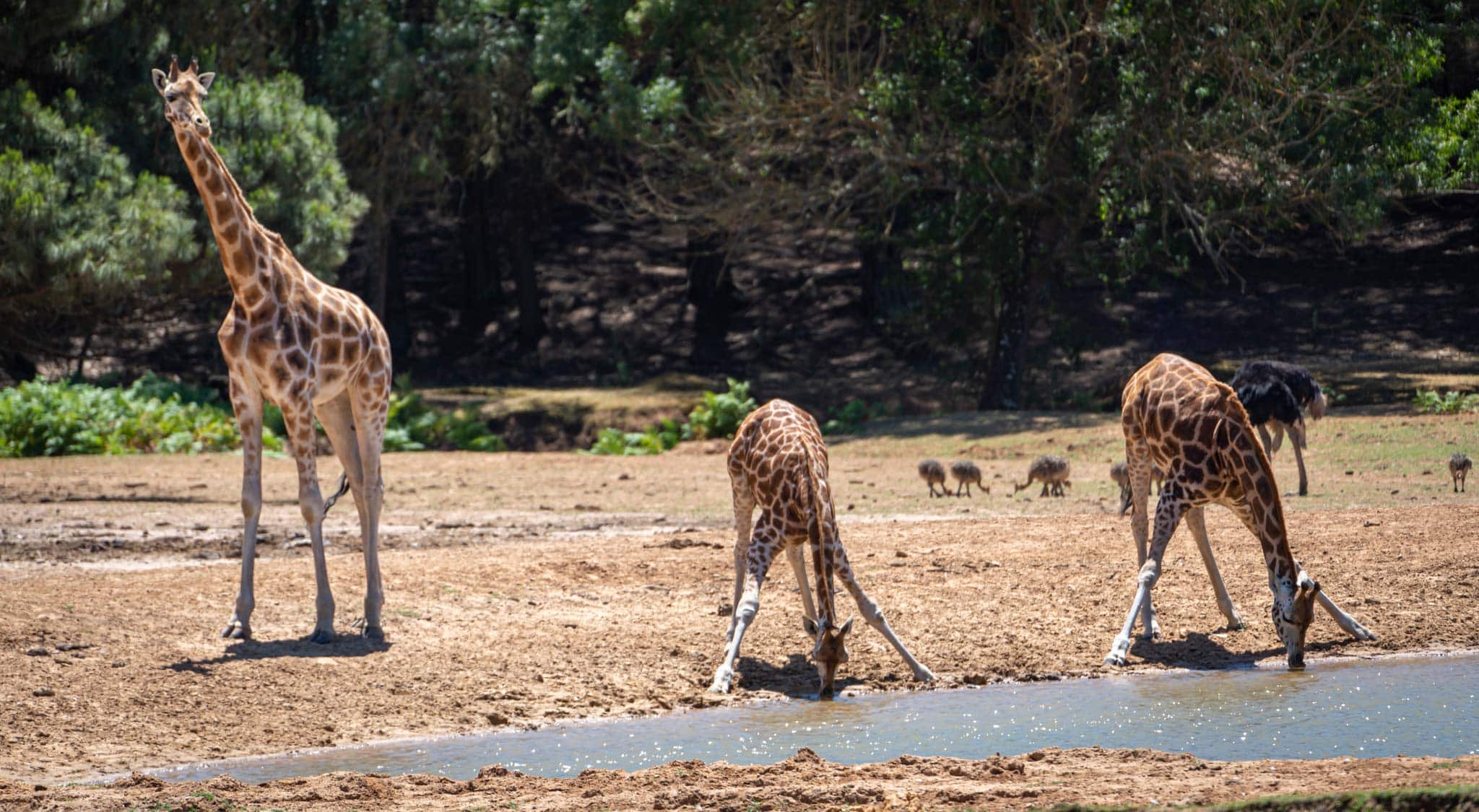
Bodeca safari park provides an alternative to the beaches
Destination – Where to travel based on coronavirus restrictions in Portugal?
The main outbreak in Portugal was initially in the north but then moved to the Greater Lisbon area, and now has been reducing all over the country so most places are considered safe destinations.
The Algarve and The Alentejo, basically the lower part of the country, have had much fewer cases, and very limited deaths, so this would, therefore, seem a more sensible place to vacation just now. You can find some hidden gems and beaches in the Algarve, or check into a vineyard in the Alentejo.
The archipelagos of Madeira and The Azores are recording very few active cases of COVID-19 too, so they are great bets, especially with testing on or before arrival in place to really limit any new transmission threads.
With villas with pools more available in the south and a lower population density, it’s also much easier to social distance without having to really think about it.
That said, there are plenty of smaller places in the country, outside of the main cities, that are usually packed with tourists but right now are pretty much empty. The famous castle towns of Obidos, in central Portugal, and Monsaraz in Alentejo are two examples I’ve visited recently and seen hardly any other people. (note, if you google Monsaraz you might see mention of some cases limited to a care-home in a nearby city with the same name, not the tourist destination).
While avoiding the biggest cities right now might seem the best way to go, I actually felt very safe in Lisbon when I spent three weeks there in July. More people wear masks outside there, and many things were super quiet, from nearly empty museums and monuments to Tram 28 without anyone waiting in the usual long lines. I wrote a thing for the local paper about my Lisbon trip here.
The Algarve has got busier in August, and we have many tourists here – however if everyone follows the rules and precautions, hopefully it can be balanced. It’s certainly quieter than normal years.
Road-trips are obviously a popular option right now, to limit the use of public transport, and campsites have reopened for tents and campers at 2/3 of capacity.
Getting around – what are the public transport Coronavirus restrictions?
Cars – As I said above, road-trips and private car rentals are likely the best way to move around the country at the moment. If you are in the same household, i.e. travelling together, then you can have the car at full capacity. Supposedly masks are required, but I think this is more for if you are sharing a car with other people not in your household.
Taxis – are operating, with the front seat empty and a reduction of capacity in the back (assuming no middle seat use). There isn’t much clarification on these, but both the taxis I’ve taken lately in the Algarve had screens between front and back, and the driver sanitised the handles when I left both inside and outside.
Buses – On the main long distance bus network, powered by Rede Expressos – they are running services again, with a capacity reduction. It looks to me like they are blocking out seats in the booking process to manage this (you are assigned a seat when booking, or choose one online). When I travelled with them, on the way to Lisbon I was seated next to someone, and on the way back I wasn’t as it was a blocked out seat.
Trains – For the trains, run by CP, these are still running, and they offer some Coronavirus precautions on their website although don’t mention anything about a reduced capacity. Officially the latest from the government was all public transport operates at 2/3 of capacity, so unsure if the rule has been changed, or just not detailed on the CP website.
While on longer distance trains, where seat reservations have always been mandatory, there are some reports of commuters train, like the local lines into Lisbon, where social distancing is near impossible and crowds are forming. Even with all services running, there simply aren’t enough extra trains to be put on to minimise this. Alternatives, like varying work hours, and bus routes, are now under consideration. For the most part, these train routes won’t be used by tourists anyway, and if you are going to use one, say to visit Sintra or Cascais, simply avoid the main commuting hours.
Masks – Please remember masks are needed on transport, but of course, there will always be some level of transmission risk in enclosed spaces regardless of what COVID-19 measures are put in place in Portugal or any country.
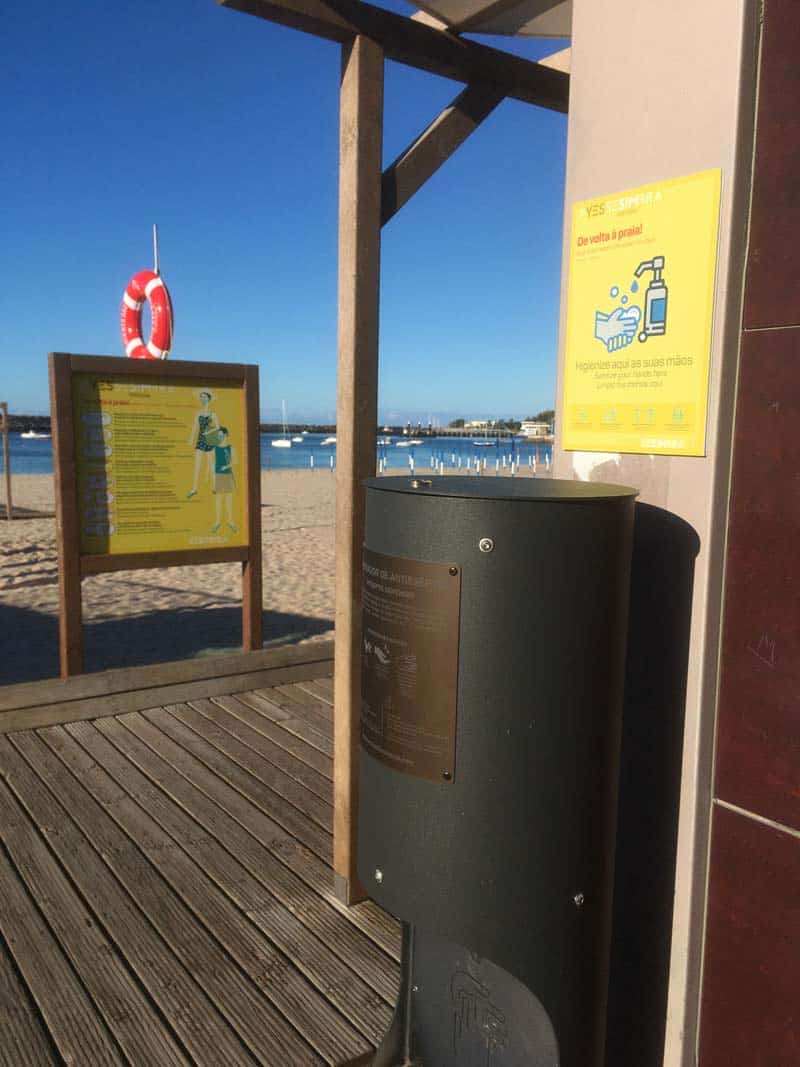
Hotels, private rentals, and guest-houses – whats the situation?
The Safe and Clean initiative mentioned above mainly applies to accommodation in my eyes, as this would be my biggest concern in terms of Coronavirus in Portugal, and limiting my contact. There is no rule on occupancy limits for hotels, but the other rules must be followed.
For sure, this year Airbnb and villa rentals will be popular, as people will want to have more private spaces. I’ve stayed in different types of properties in the past month and will give my experience below.
Hotel: SANA Sesimbra – This hotel is perhaps the best advert for the Clean and Safe system I’ve seen so far, and I was really impressed with the COVID-19 precautions that have been implement, and I’m sure most upscale hotels in Portugal will be doing something similar, especially as SANA are a chain with a few great places to stay in the county. A few things to note:
– Temperature checks were taken at check-in and daily at breakfast
– Timeslots needed to be booked for the swimming pool, and breakfast, to ensure the people limits (it was actually nice to have my 30 minutes with a private pool)
– Dining spaces were spread out by the rules, and the hotel buffet breakfast was replaced by a counter service type thing – I’ve seen many hotels advertising breakfast in the room included too. Staff were mainly behind plastic shielding walls, such as at reception.
– There were sanitiser stations everywhere, and staff seemed to be constantly cleaning
– Some changes in the room, such as a seal on the door placed by the cleaning team who do the sanitising, which should only be broken by the guest checking in. TV remotes were in covers, so they could easily be sanitised, some robes and slippers were removed to reduce the number of materials in the room to sanitise.
Guest House: Casa S. Thiago do Castelo – Obidos is usually teaming with tourists, but it was very quiet when I stayed last week. How would a smaller, non-chain business follow the rules? Well, for the most part, it was very similar to above, masks, sanitising on entry, breakfast times had to be booked as the dining room is small, so only two groups at a time, we also completed a form the night before so instead of the normal buffer, items were placed on our table.
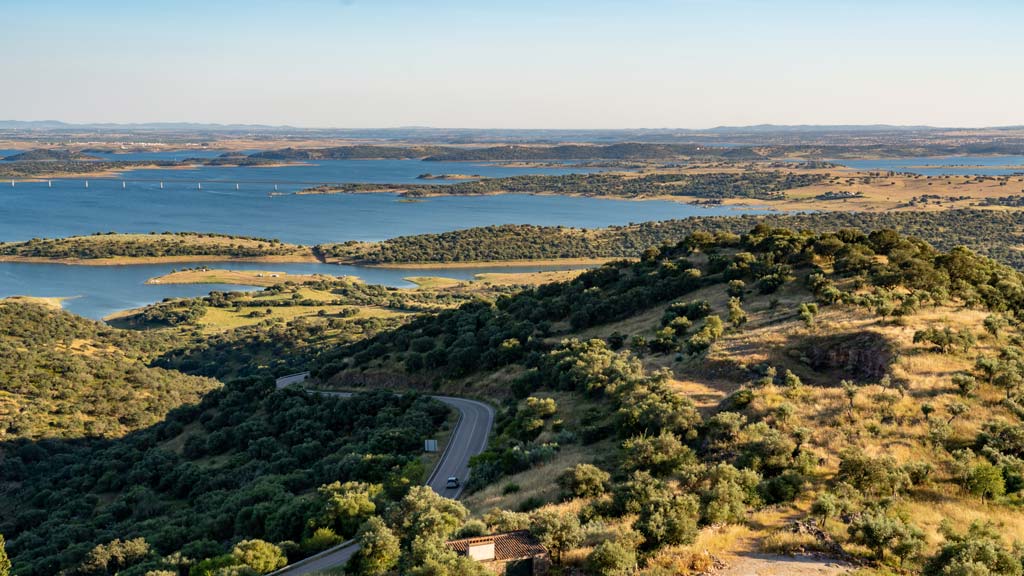
Road-trips to inland Portugal are beautiful, like here in the Alentejo
Private Home: Monsaraz, Alentejo – This was the first place I stayed after Portugal relaxed the coronavirus restrictions in May, and our host was there to greet us with a sanitiser, both for our hands-on entry, but with a spray ready to re-clean any surfaces we asked him to do, and wipe down handles and switches he touched. I did notice the bin in the bathroom had something at the bottom of it though, and while private rentals seem the most appealing as you get your own space, be mindful that in larger hotels and guesthouses with dedicated cleaning teams, they are likely doing a more in-depth job than your average rental host, so you might want to do a bit of disinfecting yourself on arrival.
If you have a communal swimming pool in an apartment complex, the rules state that precautions and capacity levels must be managed, although I’m not too sure what this looks like in reality as they don’t usually have lifeguards. People I’ve asked that rent these places also don’t really know, so you’ll have to take your own precautions for the most part I think.
Luckily, there are plenty of unique, remote and cool AirBnB options in Portugal – I think my next trip will be to stay in this awesome converted Windmill in Alentejo!
All-inclusive options: honestly, I’m not sure what they will look like this year, will try and get some feedback if/when one reopens.
Hostels: When it comes to hostels, honestly I’m not sure about the situation in the mainland. In Madeira hostel dorms can have occupancy up to 50%. I did have a brief look in Lisbon online, and it seemed most were renting the rooms privately, rather than as dorms, but I can’t find official clarification on this – will try and update in due course. Personally, I would not want to stay in a dorm room right now, especially as there are many affordable accommodation options in Portugal currently.
Tourism attractions – are they open?
Most main tourism attractions are now open again, with the usual social distancing and mask-wearing.
Some of the religious attractions, particularly convents which have residents living in them are closed, I found on my recent trip.
Smaller regional attractions were also closed in the Alentejo when I drove through, as were some in central Portugal in my most recent trip last week. Some attractions are also free currently, to limit human interaction and the exchange of cash, as card payments are now preferred, but in Portugal aren’t always accepted.
Beaches – socially distanced sun-bathing?
When it comes to the beaches, very much needed in this hot weather, there are general rules set at a nationwide level, and then local municipalities have put their own Coronavirus preventive measures in place. Let me detail the specific rules, then show some real-life examples from my travels.
The general rules and systems in place are as follows:
– An app, which shows occupancy rates for participating beaches in advance so you can see the best beach near you to visit (search Info Praia app)
– This is dictated by a traffic light system, green, yellow and red – and in some case, as you’ll see below, even physical traffic lights!
– Guarded beaches with lifeguards will see the life guars monitoring and enforcing social distancing
– The social distancing of 1.5metres between beachgoers, more on parasols
– Sports of more than two people are banned, excluding water sports
– Parking is prohibited on roads to beaches outside of the car park; they have quite quickly started putting down new double yellows too.
– More rules are on an infographic here: https://www.visitportugal.com/en/node/421175
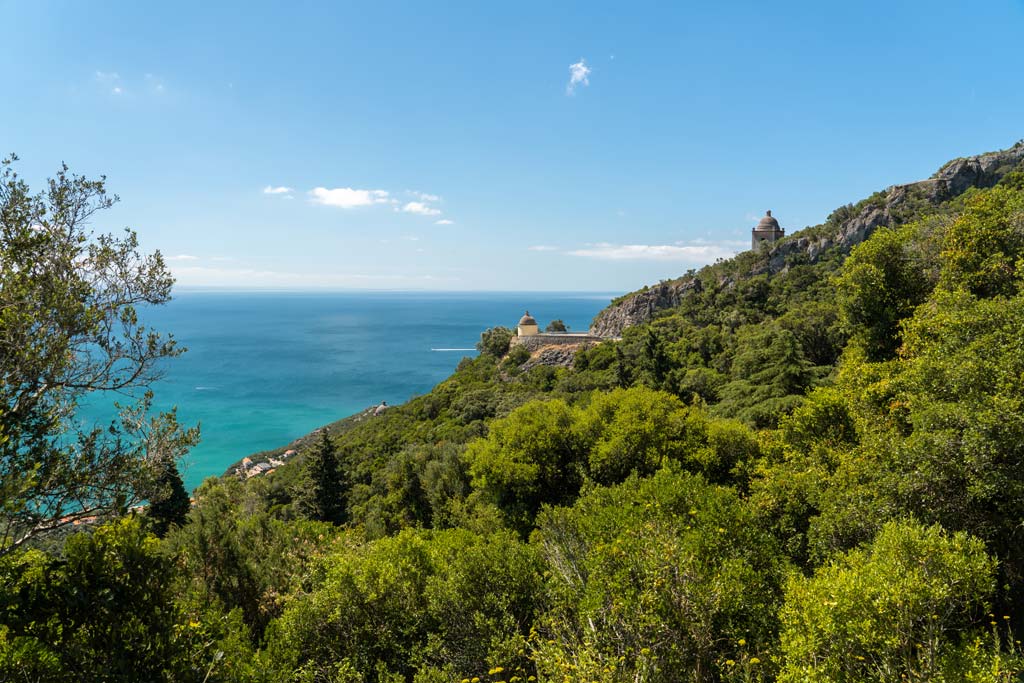
The Parque Natural da Arrábida provides Amalfi Coast style high roads, or beaches almost Caribbean likem
And from my personal experience, here is what I found:
Algarve, specifically around Carvoeiro – TMany beaches here have an actual traffic light system, counting people entering and leaving, and showing the red/amber/green sign at the entrance to the beach, and on the app. I’ve only seen it ‘red’ and labelled as at capacity a few times.
Sesimbra – In Sesimbra, I noticed they had sanitiser stations, foot-operated, on the beach, which is great. There was also a one-way system in place for entry and exit to try and limit crossover. The accessible beach platforms were wide enough for those with wheelchairs to distance; however, the wooden paths to them are still single track. There was loads of space when I visited last week on both days.
Peniche area – Beaches seemed quite quiet, especially at Baleal island. More of a surfer destination for sure and surf rental spots were open.
Lake beaches in the Alentejo – At many of the lakes inland we have beaches too, these weren’t so busy when I was there, but again they aren’t a huge tourist spot. I didn’t see any specific things put in place when I visited in May. However, beach bathing system hadn’t started yet, so perhaps now the official Portugal coronavirus precautions have been implemented.
Restaurants and bars – beers in the sun?
Excluding the Lisbon situation which I detailed above, where restaurants are the only business allowed open for booze after 8 pm, in the rest of the country the situation is quite normal.
Reservations are highly recommended for restaurants, this is due to the reduction of tables, and to allow premises to try and space out the bookings they do have with time slots. It’s common for restaurants to have Facebook pages here (more so than websites) so if you don’t have a working phone in the country, you can often try sending a FB Message to make reservations.
Night clubs and late-night bars are open with 1 am as the current closing time for establishments in most parts of the countries.
Masks must be worn when inside restaurants, cafes and similar when going to the table, to the toilet, leaving etc., but can be removed once sat at your table. Tables should be 1.5 metres apart. Menus should be disposable or in digital format (QR codes are popping up everywhere) – though some, such as wine lists, I’ve noticed are often in sanitise coverings instead. Hand sanitiser provided for use on entry and exit. Servers and staff will wear masks at all times, I believe in Madeira gloves might also be in use, although as someone who worked in Hospitality for many years I hope not, gloves usually mean people are washing hands less, and gloves are no cleaning than hands.
On outside terraces, servers will wear masks. However, there are no requirements for customers to wear them outside, though if walking through people to get to a table you should.
The bar situation in Lisbon I will update on soon, as I think this will change next week following an announcement by the Mayor of the city.

Restaurants are open, with some precautions
Day to day life – theme parks, shopping, exercise, theatres?
As I’ve mentioned before, my day to day life is relatively normal again. Gyms have started to reopen, and outside gym equipment and playgrounds are also closed. Golf has restated, and some small group tours too. Gyms in some hotels are open, with time slots and deep cleaning, expect plastic wrap to be on random things so it can be disinfected easier.
One of the major water parks in the Algarve, Slide and Splash re-opened at the start of July with some new measures, so this paves the way for some more theme parks to open in the country, I would assume.
Shops and shopping centres are open, with masks and distancing and caps on how many people can enter at a time (they make an announcement when they hit the number, and ask anyone no longer shopping to leave as they start a one in one out system), as are theatres and cinemas with empty seats for distancing, and front rows empty. Hair dressers are also open, by appointment usually.
I’ve even noticed at some ATMs there are hand sanitisers appearing next to them. Of course, the Portugal Coronavirus situation is evolving, as it is anywhere, so I’ll try and put updates here if there are more changes.
Other resources / links / official websites to keep an eye on…
Here are the places I’m mainly taking my information from, and the news I follow locally. Of course, if you have any questions, please leave them in the comments, and I will reply, and update them into the post.
Clean and Safe website hub: https://portugalcleanandsafe.com/
A handy website with various languages which offers translations of latest rules and decrees:
https://www.safecommunitiesportugal.com/
Current Mainland Portugal coronavirus restrictions for tourists: https://www.visitportugal.com/en/node/421175
Madeira: http://www.visitmadeira.pt/en-gb/useful-info/corona-virus-(covid-19)/information-to-visitors-(covid-19)
Azores: https://covid19.azores.gov.pt/?page_id=5532
Portugal coronavirus airport information:
https://www.ana.pt/en/passenger-guide/what-you-need-to-know/covid-19
Bus coronavirus information
https://www.rede-expressos.pt/en/information
Health service official website with a daily report:
https://covid19.min-saude.pt/
Heading to Portugal? Read these next…
Unusual and unique accommodation in the Algarve: Vast villas, glamping, houseboats and more
15th September 2019/by Daniel James (Dan Flying Solo)Vineyards, Relaxation and Star Gazing: A weekend in Alentejo, Portugal
17th May 2018/by Daniel James (Dan Flying Solo)Palatial, palatable Portugal: a long weekend in Porto and the Douro
24th May 2019/by Daniel James (Dan Flying Solo)My favourite Algarve Hidden Gems and Beaches
7th April 2018/by Daniel James (Dan Flying Solo)Hey! I'm Dan and I am a little bit obsessed with exploring the world, meeting people on the road and can usually be found lost and attached to a camera. I've been lucky enough to visit 50+ countries and aim to share the best travel tips, stories and guides here on the blog. If you want to be kept up to date every month + get access to the latest deals and competitions sign up on the form just down there or feel free to stalk me a bit more if you need help planning a trip, click here to get in touch!
Safe Travels, Dan
Subscribe for Updates:
- Get link
- X
- Other Apps
Comments
Post a Comment